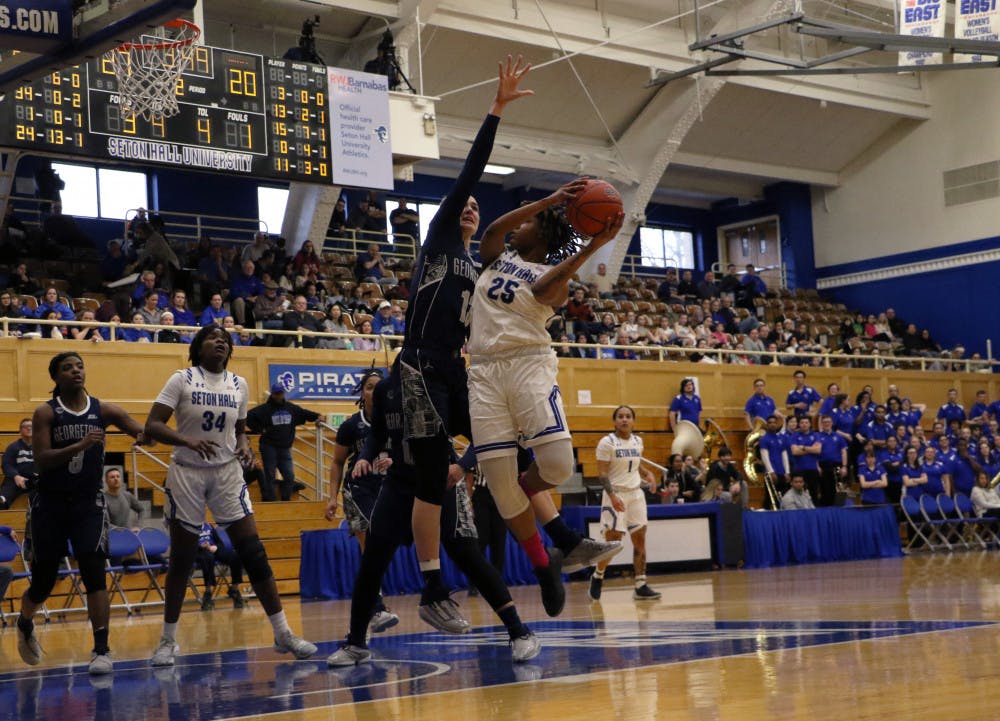It was a normal Wednesday for the Seton Hall track and field teams on Feb 24, 2010. Practice had gone on as usual. Then, the athletes were called down to the new coach's suite to meet with Seton Hall administrators.
With a majority of the team and coaching staff present, former Seton Hall President Msgr. Robert Sheeran and former Athletic Director Joseph Quinlan announced that, beginning July 1, 2010, the track and field teams would be eliminated as a cost-saving effort, while a women's golf team was going to be added to satisfy Title Nine regulations.
"Everyone was taken by surprise," former athlete Joy Alexander said. "I was wondering what happens next. I didn't know if it was permanent or if it was just going to be for a semester or two."
Anderson's opinion was shared by many of the athletes and coaches.
"I told them that there were all types of obstacles and that we all had to deal with it," head coach John Moon said.
Senior Erika Fitzpatrick recalls the initial thought amongst the team was to find a way to save the program. The team created a non-profit organization, "Save SHU Track," which was intended to raise enough money to keep the program active.
"We were thinking about fundraisers," Fitzpatrick said. "We talked to different people about different things like alumni donations to see if it was feasible.
A lot of opportunities came through. Seton Hall turned down a lot of offers. People came in with money to help save the program. I'm talking about massive amounts of money, like over a million dollars. To have that kind of help come through and for you to turn it down is kind of silly," she added.
Seton Hall athletic communications did not return phone calls seeking comment.
When the possibility of bringing the team back was not an option, many of the athletes instantly thought about transferring.
Moon noted that the scholarship athletes were not the only ones affected by the move.
"The walk-ons were affected also," he said. "The kids could have made decisions to attend other schools. Half of the kids stayed, other than those who graduated. I knew some coaches who were in need of runners, so I called them. There were other coaches who called me with personal interest in the runners."
According to Fitzpatrick, the University offered to honor all scholarships, should the athlete wish to remain at the university. They gave letters of releases to allow athletes to transfer, and even assisted the athletes in finding a team in need of help.
However, according to Alexander the University only honored the scholarships of those who continued to run for the remainder of the year.
Alexander was recruited by other schools to run this past year, but none were Division I so she elected to forgo an athletic career and focus on her education.
Though the thought of transferring crossed Fitzpatrick's mind, she decided to stay at Seton Hall because she had a talent that not many people knew about.
Prior to taking an interest in track and field, she played golf. Though she had not played golf since grade school, the thought of not being an athlete was nerve-wracking for her.
"Once you're an athlete, you're always an athlete," Fitzpatrick said. "You always have that competitive edge to you."
When Sara Doell was hired as the women's golf coach, Fitzpatrick was one of the first to express interest in playing.
Doell told Fitzpatrick to practice during the summer and report back with her scores.
At home Fitzpatrick hired a trainer and got to work, but the results were not as good as she expected.
She did not compete on the team's scorecard during the fall semester.
Nicholas Frimpong had a different experience than most others.
"A lot of coaches contacted me so I wasn't really scared," he said. "I knew that I could either stay because they were going to honor my scholarship or I had a chance of transferring and get a full scholarship wherever I wanted to go."
Frimpong visited the University of Arkansas, North Carolina and the University of Southern California but decided to remain at Seton Hall.
He has since used his time away from the track to create a non-profit organization, witnessHope.
"Growing up in Ghana was a struggle for me," he said. "I came from a middle class family; obviously we didn't have a lot of money. I ran track barefooted. I played basketball barefooted. I didn't have the necessary resources and tools to reach my fullest potential."
The mission of witnessHope is to promote sustained academic excellence, sportsmanship and healthcare in underprivileged individuals around the world.
"I see this organization in two or three years being a worldwide movement," Frimpong said.
He hosted a basketball clinic in Ghana last month and upon returning to America, has begun training for a possible Olympic run.
"My primary goal is to hopefully make it to the
Olympics in 2012." he said.
Tim LeCras can be reached at timothy.lecras@student.shu.edu.





